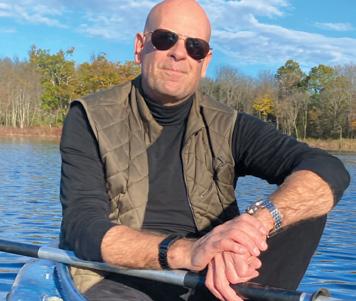
6 minute read
JEFFREY REDIGER
Jeffrey Rediger on the
Science of Miraculous Recoveries
Advertisement
by Sandra Yeyati
Board-certified psychiatrist Jeffrey Rediger is an assistant professor at Harvard Medical School and medical director of McLean Southeast Adult Psychiatry and Community Affairs at McLean Hospital, near Boston. He holds a Master of Divinity degree from Princeton Theological Seminary. For almost two decades, Rediger has studied spontaneous healing, pioneering the use of scientific tools like CT scans and lab tests, as well as personal interviews, to investigate surprising recoveries from incurable diseases. His findings are documented in his bestseller Cured: Strengthen Your Immune System and Heal Your Life, and have been discussed on The Oprah Winfrey Show, a TEDx talk and numerous public engagements.
How do you define spontaneous healing?
Science calls these events spontaneous remissions, and doctors are taught they have no medical or scientific value. On the spiritual side, they’re called miracles. These terms haven’t been examined with the tools of science. The word spontaneous in this context means without cause. Most doctors see inexplicable healings. To assume that there’s no cause for remission is mind-boggling. Everything has a cause. We just aren’t asking the right questions.
From your studies, who beats the odds and why?
I broke down recoveries into four pillars of healing and well-being that were present in most cases: nutrition, healing the immune system, healing the stress response and healing identity and beliefs.
Can you describe key elements of the first pillar—nutrition?
People who got better when they weren’t supposed to seemed to have a common understanding of nutrition that centered around whole, plant-based foods and the elimination of processed foods and sugar. In Western countries, we’re taught that most people suffer from over-nutrition and obesity, rather that malnutrition. I believe we have massive malnutrition because of processed foods. When sugar crystals coarse through the bloodstream at high levels—as we see in U.S. diets—it causes little cuts which immune cells repair over and over, creating scab upon scab until you end up with atherosclerosis.
What about the next pillar— healing the immune system?
We need to honor the science of both Louis Pasteur, who proved that germs exist and play a role in disease, and Claude Bernard, who explained that if we take care of the inner terrain (what we now call the microbiome) we won’t get sick. We’re continually surrounded by millions of pathogens,
bacteria, viruses—inside and outside of our bodies—that become invaders when something breaks down in our terrain. We overuse medicines, many of which suppress the immune system. So, we need to emphasize the magnificent 30-year research about the microbiome and take care of our bodies to avoid leaky gut and other conditions that act as entrance points for disease.
What about the pillar related to stress?
Most of the people I studied learned to eliminate certain stresses so they could maximize the quality of their remaining time. This led to healing. We have to widen our window of tolerance for stress so it doesn’t keep us in fight, flight, freeze or fawn, and to differentiate between “challenge stress” and “toxic stress”. Running a marathon can be a challenge stress that helps you reach your higher self, expand your understanding of what you can achieve and prompt a repair response for muscles. But if every day you’re told you don’t matter or are unappreciated at work, that toxic stress can wear down your understanding of your value.
The deep chasm we’ve created between mind and body doesn’t exist. Doctors are taught to find symptoms, make a diagnosis and start a medication. But whether a patient comes in for back pain, a heart attack or an autoimmune flare-up, it’s critical to ask them what has been stressful lately and try to get the story of the illness. Usually, that will prompt a cathartic recount of stresses that relate to what’s going on physically. Helping people understand the deeper story of their illness and find a path to healing around that can be life-saving.
Gabor Mate says, “If you don’t know how to say no, your body will eventually say no for you.” Our hospitals are full of people who spent their entire lives taking care of everyone else and being conflict-avoidant. The body keeps the score and tells the story. We can learn to listen to what our bodies are telling us about honoring the dignity and value that we bring into the world; set up a life and boundaries that support that; and educate therapists and the public about what trauma is and how to recover from it.
Can you explain the fourth pillar—healing identity and beliefs?

This is the big one, which people said was the reason they were grateful for their illnesses. When people are diagnosed with an incurable illness, although they’re terrified, many (more than you would think) are also relieved. They’ll say, “If I only have six months to live, then I don’t have to take over the family business like dad’s pressuring me to do.” That preparation to die often becomes a doorway into a different life. When you decide to focus on what you need and want, that death of the false self allows the birth of a more authentic self that becomes its own journey to healing.

How does spirituality affect healing?
Spirituality has to do with how we feel about who we are, how we experience our value in the world and what kind of universe we live in. Is the universe friendly and caring or unfriendly and uncaring? If we experience ourselves and others as human beings who have value and bring beauty into the world, that’s very different from feeling alone, defective or not good enough. How a person feels at a deep, conscious or unconscious level about themselves and the universe is a massive factor in terms of their vitality and health.
What can people learn from your research?
Take compassionate and firm charge of your minds, bodies and life. Doctors teach patients to be passive recipients of care, but the possibilities of healing come from within. It’s not about taking a medication as much as understanding our value, assertively taking steps to create a community of people who care about us and developing a path towards healing that’s rooted in an understanding of our deeper story.
In Western culture, if someone has a medical problem they’re sent to a physician. If they have a psychological problem, they see a psychotherapist. If they have a spiritual problem, they’re sent to the priest, rabbi or imam. That’s helpful, but we also need to stand back and look at the big picture. The people I studied got better because they brought mind, body and spirit together and integrated it into an empowering meaning that made sense to them. The spiritual piece can’t be partitioned. It animates the whole.
Sandra Yeyati, J.D., is a professional writer and editor. Reach her at SandraYeyati@gmail.com.
Learn. Discover. Enjoy.
Jacksonville’s Complete Center for Psychic Developement and Self Discovery Holiday Events
Christmas Party • Saturday, Dec. 17 from 12noon-5pm
Catered lunch. Reservation Required. Make your own ornament! Adults $10 Children $5 Jewelry Show • Saturday-Monday, Dec. 17-19
Gemstones, vintage-inspired, sterling silver, symbols and more! Save 20% off all jewelry purchase over $20. Healing Events
3 Day Retreat • Friday, Dec. 9 - Sunday, Dec. 11
Create a healthy pathway to connect with your higher self. Receive a Lemurian Crystal, supplies and food included. RSVP. 2.5 Hour Meditation • Sunday, Dec. 25 from 4:30-7pm
Yoga mat or chair – 15 min. breaks – RSVP








